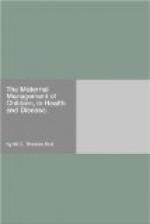The little one that has just taught itself to run alone from chair to chair, having two or three teeth pressing upon and irritating the gums, will for a time be completely taken off its feet, and perhaps lie languidly in its cot, or on its nurse’s arm.
The legs being drawn up to the belly, and accompanied by crying, are proofs of disorder and pain in the bowels. Press upon this part, and your pressure will increase the pain. Look to the secretions from the bowels themselves, and by their unhealthy character your suspicions, in reference to the seat of the disorder, are at once confirmed.
The hands of a child in health are rarely carried above its mouth; but let there be any thing wrong about the head and pain present, and the little one’s hands will be constantly raised to the head and face.
Sudden starting when awake, as also during sleep, though it occur from trifling causes, should never be disregarded. It is frequently connected with approaching disorder of the brain. It may forebode a convulsive fit, and such suspicion is confirmed, if you find the thumb of the child drawn in and firmly pressed upon the palm, with the fingers so compressed upon it, that the hand cannot be forced open without difficulty. The same condition will exist in the toes, but not to so great a degree; there may also be a puffy state of the back of the hands and feet, and both foot and wrist bent downwards.
There are other and milder signs threatening convulsions and connected with gesture, which should be regarded:—the head being drawn rigidly backwards,—an arm fixed firmly to the side, or near to it,—as also one of the legs drawn stifly upwards. These signs, as also those enumerated above, are confirmed beyond all doubt, if there be present certain alterations in the usual habits of the child:—if the sleep is disturbed,—if there be frequent fits of crying,—great peevishness of temper,—the countenance alternately flushed and pale,—sudden animation followed by as sudden a fit of languor,—catchings of the breath followed by a long and deep inspiration,—all so many premonitory symptoms of an approaching attack.
OF THE SLEEP.
The sleep of the infant in health is quiet, composed, and refreshing. In very early infancy, when not at the breast, it is for the most part asleep in its cot; and although as the months advance it sleeps less, yet when the hour for repose arrives, the child is no sooner laid down to rest, than it drops off into a quiet, peaceful slumber.
Not so, if ill. Frequently it will be unwilling to be put into its cot at all, and the nurse will be obliged to take the infant in her arms; it will then sleep but for a short time, and in a restless and disturbed manner.
If it suffer pain, however slight, the countenance will indicate it; and, as when awake, so now, if there is any thing wrong about the head, the contraction of the eye-brow and grinding of the teeth will appear; if any thing wrong about the belly, the lips will be drawn apart, showing the teeth or gums,—and in both instances there will be great restlessness and frequent startings.




